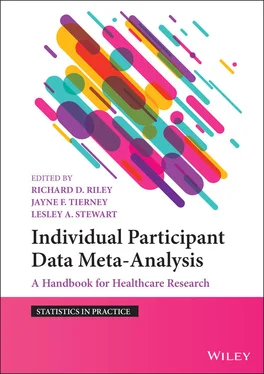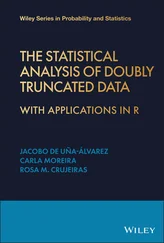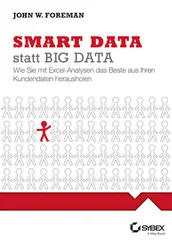Generally, IPD meta‐analysis projects will take upwards of two years to complete, and sometimes longer depending on how many trials are involved and the complexities of negotiating collaboration, data coding, checking, cleaning and analysis. Delays may be outside the control of the project team. Flexibility in staffing and scheduling is needed to accommodate this, which can make setting and meeting funder milestones challenging. In our experience, extensions to the original timelines agreed with funders may be required, particularly if key trials delay sending their IPD. Work may be most intense at the beginning and end of a project, and this can be borne in mind when planning resourcing and staffing. Nonetheless, it is important that projects are actively managed at all times and that the research team keep on top of projects and moving them forward.
Prospective IPD meta‐analysis projects will additionally need to run to timelines that accommodate those of the participating trials ( Section 3.12).
3.8 Estimating the Resources Required
IPD meta‐analysis projects cannot be done by a small volunteer review team and usually cost more than a standard systematic review. However, they are considerably less expensive than carrying out a new clinical trial, which may be the only reliable alternative to addressing the research question that the IPD meta‐analysis aims to resolve.
Box 3.3lists the main costs involved in an IPD meta‐analysis project, and may be useful starting point in preparing a budget and seeking funding. Most items should be self‐explanatory. Some costs are similar to conventional systematic reviews such as those involved in acquiring publications (e.g. inter‐library loan charges) and some aspects of dissemination activity such as open access publishing fees. Additional costs are more specific to individual projects, and largely correlate with the number of trials, complexity of the IPD obtained, and type and number of analyses required, as these are major drivers the staff effort needed.
Funding staff time is likely to be the largest project cost. Whilst the staff resource needed for some tasks will be similar to a conventional systematic review, such as those associated with searching and screening studies for inclusion, other costs will be highly dependent on the size and scope of the project. As described in Section 3.7, sufficient staff time needs to be allowed for checking and recoding variables within IPD and for performing the analyses.
In addition to the time taken to manage and oversee a major research project, the time needed for managing the wider collaborative process, for negotiating data provision, and for communication and collaboration must also be budgeted for, but is easily overlooked. For example, an IPD meta‐analysis project that included IPD from 31 trials involved sending and receiving over 5,000 separate emails. 79Given that even the simplest of these probably takes a few minutes to handle, it is not difficult to see how the resource spent on this type of activity mounts up. As managing the collaboration has potential to be sensitive and political, a significant amount of principal investigator time may be needed for communication.
Box 3.3Typical costs incurred in an IPD meta‐analysis project
Staff Costs
Principal investigator (considerable time may be needed for this strategic and diplomatic role)
Clinical/topic expert members of team (resource depends on level of involvement)
Experienced statistician (to plan supervise and undertake complex syntheses)
Statistician(s) (to plan, code and carry out analyses)
Researcher(s) (to screen, assess risk of bias, re‐code, check data)
Information specialist (likely to be similar to a standard systematic review)
Administrative support (e.g. to organise results meeting)
IT support (if there are special requirements or if not provided by host institution)
Legal input to data‐sharing agreements (if not provided by host institution)
Inter‐library loans and document acquisition (similar to a standard systematic review)
Telephone and teleconference calls with trial investigators
Conference calls for advisory or collaborative group meetings
Any travel likely to be needed to secure provision of data
Any specialist software required for data management or statistical analysis
Data preparation bursaries or fees to trial investigators for preparing data (if these are used)
Any fees to data‐sharing repositories for access to data
Any special licenses required to read/handle repository data
Travel and venue costs (can be reduced by holding most meetings virtually)
Catering for face‐to‐face meetings
Patient and Public Involvement Costs
Payment for contributed time, including preparing for and attending meetings
Travel to meetings and incidental expenses
Collaborative Group Meeting
Venue and equipment hire
Catering during meeting
Other catering costs (customary to include at least a group evening meal)
Travel costs or bursaries (taking account of geographical location of studies when costing)
Accommodation (those travelling long distance may require this pre‐ or post‐meeting)
Costs associated with presenting results at relevant conference
Open access publishing fees
Production of plain language summaries
Production of any web or other audio/visual materials
The above listing covers typical costs, and should be adapted according to the specific requirements of the project.
Source: Lesley Stewart.
A commonly asked question is whether trial investigators should be paid to participate and prepare their IPD. Whilst this acknowledges contribution and may reimburse or partially reimburse time taken to prepare data, there is no evidence that offering funds provides an incentive to collaborate, particularly if it is a token amount (as shown in a randomised trial 75). Many IPD meta‐analysis projects have been completed successfully without offering payment, and routinely paying for data provision could render many IPD projects unaffordable. Ideally, the ability to provide robust answers to questions that are likely to matter to trial investigators and the academic credit generated through involvement in an IPD meta‐analysis (including authorship), will provide sufficient motivation to participate. Moreover, for more recent trials that have been managed and stored following good practice, it should be relatively straightforward for trial personnel to export and potentially even to re‐code their IPD. Indeed, many trials are funded by organisations that expect trial data to be made available for other researchers on trial completion ( Box 3.4). One option may be to provide some assistance in the form of data preparation bursaries for those who would otherwise have difficulty in securing the staff time needed to prepare the data. For example, bursaries might be warranted if trial personnel have moved institutions but are willing to prepare IPD in their own time; or if IPD are archived and costs are associated with retrieving this or in transposing data from obsolete storage media. However, this is difficult to predict and remains a difficult issue that will require careful assessment in relation to specific IPD meta‐analysis circumstances.
If IPD are to be obtained from repositories, any costs associated with this need to be incorporated in the budget, including any hidden costs such as a requirement for specialist software or licences to read original data. For example, an IPD network meta‐analysis that wished to use data from pharmaceutical company trials through clinicalstudydatarequest.com was required to have a WHO Drug Dictionary license at an approximate cost of almost £7,000 per sponsor. 75
Читать дальше












